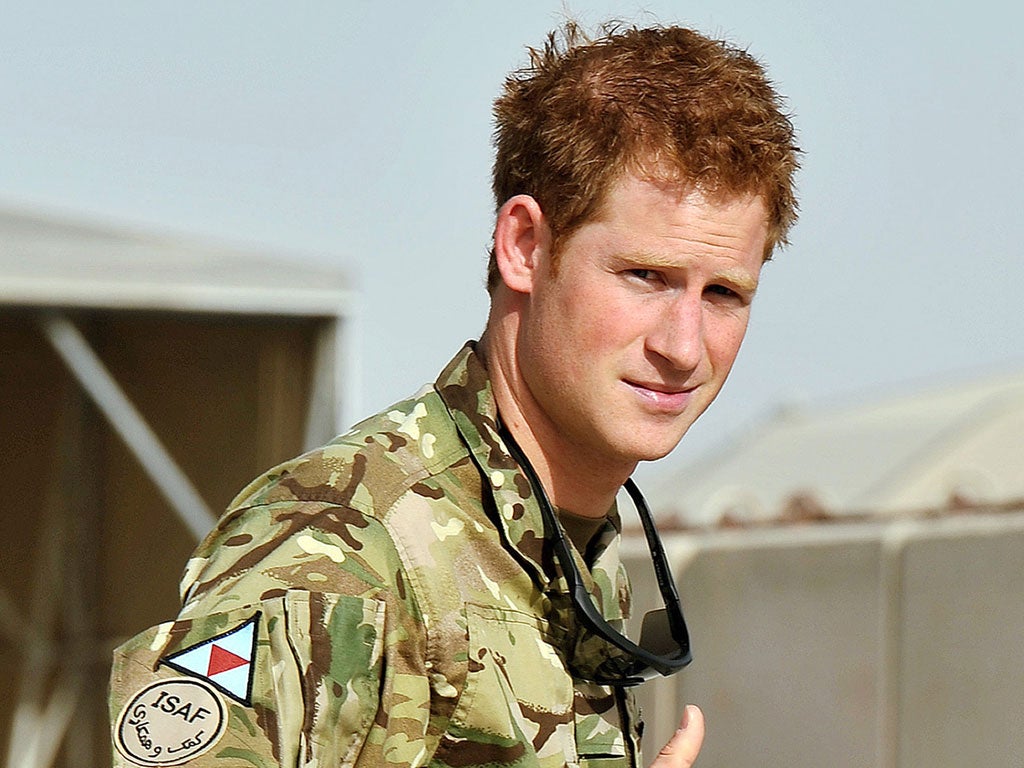Prince Harry returns to Afghanistan on mission as Apache helicopter pilot
Four years after his last tour of duty, Captain Harry Wales returns to the front line

Prince Harry has returned to Afghanistan four years after he was forced to leave the country while serving as a soldier in Helmand.
The media had until today voluntarily maintained silence on the deployment for "security reasons", following requests from Buckingham Palace and the Ministry of Defence (MoD).
However, while the entirety of the Prince’s last tour was the subject of a supposed blanket embargo, there will this time be coverage of his four-month mission as an Apache helicopter pilot.
The arrangement between the British media and the MoD fell apart in 2008, 10 weeks into his tour, when an Australian website revealed his presence in Afghanistan, prompting a hurried evacuation.
Since then the third-in-line to the throne has privately stated on a number of occasions his desire to return to continue his duties.
Defence chiefs had considered the option of restricting the Prince’s possible deployment, posting him away from the front line. However he has since qualified as an Apache pilot, winning an award for the best co-pilot gunner on the 18-month course, and saying it would be pointless to put him through costly training if he was to be barred from going into combat.
Captain Harry Wales, as he is officially known in the Army, said in an interview: “You become a very expensive asset, the training’s very expensive and they wouldn’t have me doing what I’m doing. I’d just be taking up a spare place for somebody else if they didn’t have me going out on the job.”
The reason for media silence given by the MoD at the time of his first deployment in December 2007 was that disclosing his whereabouts would make him and those serving alongside him particular targets for insurgents.
The same pressures should not apply as an Apache pilot; none of the Apache helicopters have, so far, been shot down.
Harry will be based out of Camp Bastion where he will work as part of the Joint Aviation Group which provides helicopter support to the International Security and Assistance Force in the south-west of the country. He has been trained to fly in the front seat as the mission commander, a role that mostly involves operating the aircraft’s sights, sensors and weapons systems.
Prince Harry was in the headlines recently after photographs of him cavorting naked with young women during a trip to the US appeared on the web.
Although there was condemnation of his behaviour by some public figures, 33,000 people, including servicemen in Afghanistan, joined an online group “Support Prince Harry With A Naked Salute”, some doing precisely that and posting the images online.
Prince Harry would have received pre-deployment cultural awareness training where it is stressed upon departing personnel that they will be operating in the deeply traditional and conservative Pashtun region.
Training: Lessons in local culture
Cultural awareness training for personnel deployed to Afghanistan was introduced to avoid “misunderstandings” which had taken place in the early days of the British presence in Helmand, leading to friction with civilians and, at times, Afghan forces.
It is normally a quick trot through areas of religious and cultural sensitivities such as what procedure to follow while searching women’s quarters in Afghan homes; offences which may be caused by the presence of pork and alcohol; and the avoidance of statements which may be construed as racial slurs. Servicemen and women are also instructed to dress modestly and use moderate language.
Join our commenting forum
Join thought-provoking conversations, follow other Independent readers and see their replies
Comments